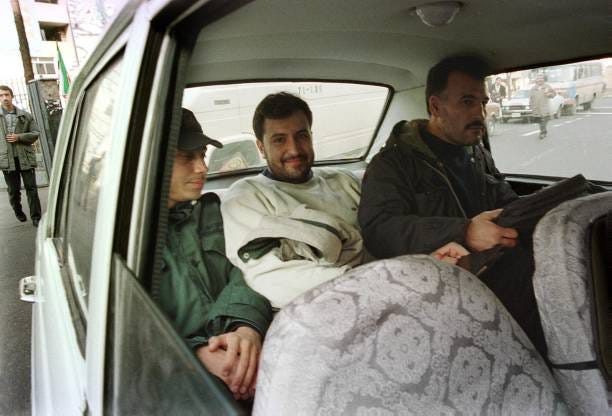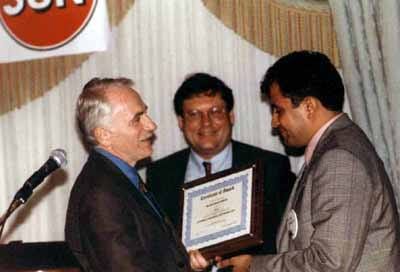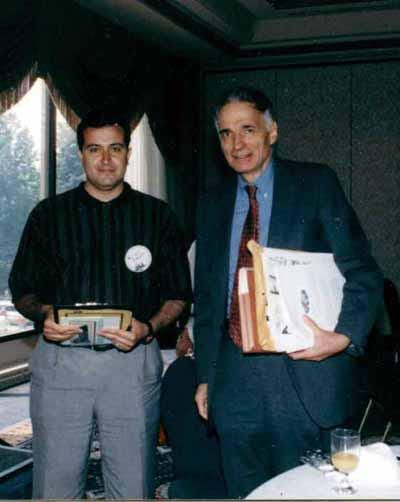The Cost of Freedom vs. The Cost of a Hospital Stay
How Winning an Award Put Me in the ICU—Right Next to the Butcher of Press
After recounting my recent hospital escapades and the financial gymnastics of insurance companies, a friend casually asked, "Did you ever deal with hospitals or medical care in Iran?" That simple question unleashed a flood of memories too outrageous to keep bottled up.
Back in 2001, I got a call from Robert Russell, director of Cartoonists Rights Network International, informing me that I’d won the prestigious International Award for Courage in Editorial Cartooning. Exciting, right? Sure—except I knew Judge Mortazavi and the Iranian judiciary weren’t exactly going to throw me a party. Nostalgia for Evin Prison? No, thank you!

I refused any cash prize that came with the award because, in Iran, that could spiral into accusations of espionage for “enemies of the Islamic Republic.”
That year in June, American and Canadian editorial cartoonists were hosting their annual convention in Toronto, where I’d receive the award at the closing ceremony. Challenge number one: getting a Canadian visa. The invitation letter arrived just as President Mohammad Khatami summoned me to explain my critiques of his government’s dam-building obsession (a.k.a. “How to Ruin a Country in Three Easy Steps”).
Three days after the 2001 presidential elections, I was bouncing between the Canadian Embassy to apply for a visa and Khatami’s office. Obviously, I didn’t mention to the president that I was about to accept an award basically titled, “Best at Annoying the Regime.”
The visa arrived a day before the convention, cutting it closer than a cartoonist meeting a deadline. With borrowed money and black-market dollars, I finally made it to Canada. At the airport, KAL, the legendary Economist cartoonist, greeted me. Meeting him and other renowned cartoonists felt like walking into a Marvel movie—except instead of superheroes, these were super-satirists. I was equal parts starstruck and terrified I’d embarrass myself.
The convention was unforgettable. Sitting next to Ralph Nader at lunch was fascinating, even though half the cartoonists still held him responsible for Al Gore’s loss. That day, someone offered to help me stay in Canada and secure a job in Northern Ontario if I applied for asylum. It was tempting, but the thought of leaving my wife and two-year-old daughter behind in Iran was unbearable. I clung to the (naïve) hope that Khatami’s second term might bring improvements—or at least lead to my legal case being dropped.
At the closing ceremony, I officially became the world’s bravest cartoonist—though my wisdom tooth didn’t get the memo. Mid-dinner, its filling popped out, leaving me with a throbbing cavity and a deep sense of betrayal. Canadian dental care was way out of my budget, so I soldiered on, juggling my toothache and my new title.
A few days later, after picking up another award (because why stop at one?), I headed back to Tehran. On the flight to Zurich, my toothache turned into a full-blown crisis. By the time I landed in Tehran, I was begging friends to find me a dentist ASAP.
Back home, the real trouble began. News of my Courage Award had reached the judiciary, and Mortazavi—the infamous “Butcher of the Press”—was not amused. Summoned to court on day two, I knew showing up without my lawyer (who was in France) would mean a one-way ticket to prison.
By day three, I was in the dentist’s chair, reliving a scene from Marathon Man. “Is it safe?” kept running through my head as the dentist drilled into my infected tooth. I thanked every deity I could think of that my interrogators hadn’t gone to dental school.
The situation escalated into a root canal. Distracted by my impending court appearance, I forgot to mention my heart condition and medications. The dentist, in an effort to control the pain, gave me a strong anesthetic. By the time I stepped out of the clinic, my heart rate hit 250 beats per minute, and I was one step away from meeting my maker. Hours later, I was rushed to the ICU—just in time to avoid crossing that line.
The good news? I survived. The bad news? The hospital was less than 30 feet from Mortazavi’s office. From my ICU window, I spotted him pacing like a villain in a bad TV drama, oblivious to the fact that I was watching. My heart, of course, decided to try for a new record, and nurses had to dose me to avoid a cardiac episode.
Then came the twist: my doctor turned out to be a cousin of Abolhassan Banisadr, Iran’s exiled former president, and he even sounded like him. If Mortazavi had discovered this, he’d have spun it into a conspiracy case. Dr. Banisadr suggested an angioplasty, but another doctor vetoed it, reasoning that if I got arrested post-procedure, things could get worse—because obviously, they weren’t bad enough already.
I survived Mortazavi, the ICU, and the toothache. The private hospital charged me only 120,000 Tomans—about $200—saving me from a financial heart attack. Honestly, I wish that hospital’s accountant would move to the U.S. and take over my current medical bills—they’re the real cause of my heart problems now!





